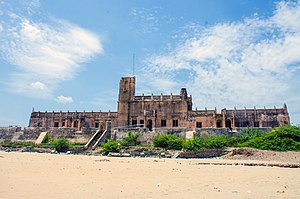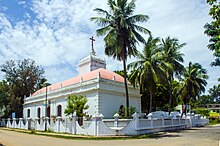Tranquebar (or Tharangambadi) is a small coastal town in Tamil Nadu 120 km south of the former French colony Pondicherry (Puducherry). Tharangambadi literally means the land of the singing waves. From 1620 to 1845 it served as a Danish trading post in India and came to be known as Tranquebar. Tranquebar is also known for its ozone-rich beaches.
Understand
[edit]


The place dates back to the 14th century. Masilamani Nathar (Shiva) temple was built in 1306, in a land given by Maravarman Kulasekara Pandyan I. Until 1620, when the Danes came, the place was part of the Thanjavur Nayak kingdom. Danish admiral Ove Gjedde felt the place would be a potential trading centre, made a deal with Raghunatha Nayak, and built a fort, which is known as Fort Dansborg. Fort Dansborg was the residence and headquarters of the governor and other officials till 1845, when along with Serampore in West Bengal, it was sold to the British.
The Danish converted the sleepy fishing hamlet into a colonial town complete with European-styled mansions and churches. Today the Danish Fort of Dansborg still dominates the Tranquebar skyline and the fortified town still has its share of colonial charm and legacy. The coastal town complete with forts, churches and colonial buildings is surrounded by high walls complete with bastions and stands as a colonial island surrounded by a rural landscape.
Get in
[edit]Tranquebar is better known with its local name, Tharangambadi, so ask for bus/taxi for the same.
Bus
[edit]The best way of getting to Tranquebar is by bus. Bus route 324 runs all the way from CMBT (Chennai Mofussil Bus Terminal) in Madras along the coast to Nagapattinam south of Tranquebar. The bus will make stops in Pondicherry, Cuddalore, Chidambaram, Tranquebar and Karaikal on the way to Nagapattinam, so it is perfect if you already are in one of these cities. From Madras the trip will take around 7-8 hours, from Pondicherry around 4 hours, from Karikal around 30 minutes and from Nagapattinam around one hour. The busses come in three different classes: Regular, UD (ultra deluxe) and AC (Air Conditioning). Regular busses are bad even by Indian standards, Ultra deluxe busses are bad by western standards (no A/C or reclining seats) while AC busses (blue and white with closed windows) are really good. A trip from Madras to Nagapattinam on AC bus is less than ₹300, so unless you are on a really tight budget AC is the way to go.
Rail
[edit]Mayiladuthurai is the nearest railhead and is located 31 km from Tranquebar. Mayiladuthurai is well connected with Chennai and Rameshwaram
Get around
[edit]Tranquebar is small enough for you to easily be able to walk around and the entire area can be covered in 3-4 hours. If you are a true history buff and want to see all the sites like the remains of Peter Anker's country house and gardens or the Governor's Mansion in nearby Porayar, it may make sense to hire a pedal bike. If you're starting from Pondicherry, its possible to start and return from Tranquebar the same day.
See
[edit]






- 1 Fort Dansborg. 10:30AM–5PM. A Danish 17th-century fort facing the coast. The construction of the fort began immediately after the arrival of the first Danish trading expedition and the establishment of a treaty regulating trading rights between the Nayak Raghunatha in Thanjavur and the Danish East India Company in 1620. Until the end of the 17th century the fort was used for residential and storage purposes; subsequent increase in population forced the Danes to move out and occupy surrounding areas as well. While it was previously crumbling away, the Fort has been renovated by Indian volunteers and Danish non-profit organisations. It houses a small museum inside that has some artifacts and a history of the Danish Settlement. ₹5 per person.
- 2 New Jerusalem Church, King Street. The New Jerusalem Church was built in 1718 by the German missionary Bartholomäus Ziegenbalg. It replaced the old Jerusalem Church which proved too small for the growing local Christian population. The church has a cross-like floor plan. The Danish coat of arms is inscribed on the top of the gateway leading to the interiors of the church. The interior contains several memorial plaques and even a few graves including that of Ziegenbalg. The church is housed in a large compound which also has several graves.
- 3 The Old Danish Cemetery, Kavalamettu Street. Small cemetery that holds the whitewashed graves of several Danish colonial officials and tradesmen. Don't expect a Danish style cemetery as found in Copenhagen. It is a small compound with a locked gate and several headstones standing forlornly in a barren patch of land.
- 4 The Town Gate, King's Street. 'Landporten' as the Town Gate is called in Danish forms part of the fortifications that were built around Tranquebar in the 1660s. In 1791 the original gate was destroyed and the existing one constructed in its place.
- 5 The Ziegenbalg Museum Complex (Ziegenbalg Press), Admiral Street (Inside TELC Bishop Johnson Memorial Higher Secondary School complex). The press where Ziegenbalg printed his first Tamil Bible still stands and is located inside a local school. The printing press is displayed along with the printed copy of the first Tamil Bible. The handwritten Tamil Bible by Ziegenbalg is also on display. The press is still functional and one can gets his name printed in Tamil by using the blocks made by Ziegenbalg.
- 6 The Zion Church, King Street. Consecrated in 1701, it is the oldest protestant Church in India. Prominent with its combination of colonial and Indian architectural features, its construction together with the fortification of the town marked the moving out and spreading of the Danish population into the surrounding settlement. The structure went through many reconstructions before it reached its present form.
- 7 Ziegenbalg Landing Plaque (north west corner of the fort). The plaque commemorates the landing of the first Ev Lutheran missionaries to India. The plaque stands at the very spot where Bartholomaus Ziegenbalg and Heinrich Plutschau landed on 9 July 1706. It was erected in 1906 by the Leipzig Ev Luth Mission to celebrate the 200 years of landing. The plaque is mounted on an irregular mountain-like memorial topped with a cross. The plaque was severely damaged during the tsunami of 2004. In 2012 the monument was upgraded, with a stone-tiled floor and low octagonal boundary wall.
- 8 Tharangambadi Maritime Museum (North west corner of the fort). 9:30AM–1:30PM, 2:30–6PM. Tharangambadi Maritime Museum is housed in the former residence of the Danish Commander. The 18th-century bungalow. It was restored by the Danish Tranquebar Association. It now houses the Tranquebar Maritime Museum. The museum contains a remains of an old ship along with boats and other maritime artifacts. Also, there is a section dedicated to marine creatures. A golden statue of Ziegenbalg stands at the entrance of the museum. The statue was put up in 2006 to commemorate the tercentenary of his landing. Plaques both in English and Tamil mention the achievements of Ziegenbalg.
- 9 Governor House (Next to Maritime Museum). The colonial bungalow once served as the residence of the Governor of Tranquebar. It overlooks the sprawling open space known as the parade ground. The Bungalow has been restored and there are plans to put it into some adoptive reuse.
- 10 Rehling’s House, King St (Opposite New Jerusalem Church). One of the most stately buildings of colonial Tranquebar it once served as the residence of the Danish Governor. It is named after Johannes Rehling and dates back to the first half of the 18th century. The building has an elegantly decorated white colonnaded facade giving it an elegant look.
- 11 Ozone Reach Beach. The coastal town has its share of beautiful beaches. The beaches are rich in ozone and a 1960 Danish research puts Tranquebar as one the top ozone-rich beaches in the world. The beach has rocky outcrops and is unsuitable for bathing and swimming. The Dansborg fort towers above the beaches of Tranquebar.
- 12 Masilamaniswarar Shiva Temple (Masilamani Nathar Temple), On the beach (Near the Bungalow on the Beach). Dating back to the Pandian era, this temple was erected in 1306. An inscription to this effect is exhibited in the Dansborg Museum. The temple was dilapidated and heavily eroded by the sea but thanks to restoration undertaken by INTACH, the temple is now as good as new and is worth a visit.
Do
[edit]- Arts and Craft Centre. This centre is being developed for presenting the traditional arts and crafts of this region. The centre is located in a set of restored Tamil houses that were taken up by some NGOs after the tsunami.
- Take a Walking Tour. A good place to start is the Bungalow on the Beach on King's Street. Ask for a map there and set out to see the sights. At a comfortable pace the tour should not take more than a couple of hours. You can end the tour with a beer at the Bungalow!
Buy
[edit]Eat
[edit]- The Bungalow on the Beach, King's Street. The only dining option in Tranquebar. They serve a fairly decent continental fare with main course at the range of ₹200.
Drink
[edit]- The Bungalow on the Beach. You can order a beer here, just that it comes marked as fruit juice in your bill. ₹150 for a bottle of Kingfisher.
Sleep
[edit]- 1 The Bungalow on the Beach, King's Street. The most upmarket place here, it is housed in the renovated British Collector's house. Run by the Neemrana group it has about eight rooms ranging from ₹500 to ₹5000 per night (Oct 2009). No internet.
- 2 The Gate House, King's Street. The annex of The Bungalow, it is next to the Town Gate and has six rooms ranging from ₹000 to ₹3500 per night (Oct 2009). No internet. No restaurant: you must walk 5 minutes to the Bungalow for meals.
- The Nayak House, Post Office Street (walk along the Post Office Street till you hit the beach and go on till where Goldsmith Street meets the beach). Another place run by Neemrana with three rooms ranging from ₹1000 to ₹2000 per night (Oct 2009). No internet.
- The Tamil Nadu House, Post Office Street. The budget accommodation option also run by the Neemrana people has non air conditioned rooms available from ₹600. They serve breakfast and lunch but for dinner one has to go to the Bungalow.
- 3 Royal House and the Park.


